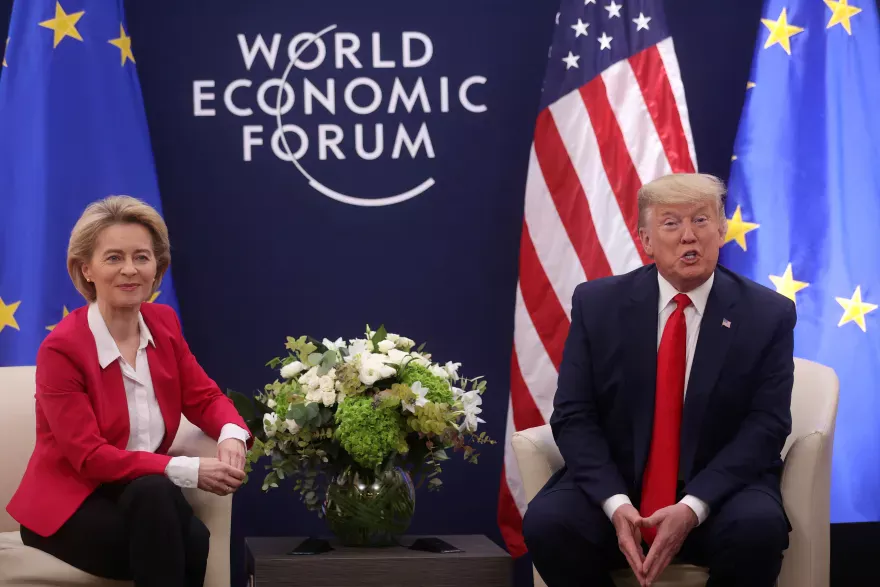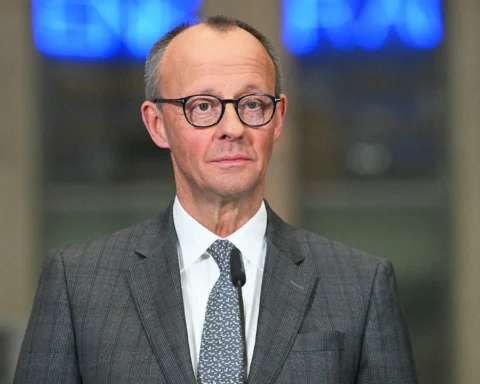The Trump administration has not minced words when it comes to Europe, frequently lambasting the continent for perceived shortcomings in defense spending, trade imbalances, and geopolitical freeloading, but behind closed doors, their disdain runs even deeper. Leaked communications and insider accounts reveal a level of contempt that outstrips the administration’s public rhetoric, painting European allies as “pathetic” and “weak” in private discussions.
This dual-track approach—public reprimands paired with sharper private jabs—underscores a growing rift in U.S.-European relations, raising questions about the future of NATO and transatlantic cooperation as President Donald Trump charts his foreign policy course in his second term.
The tension came into sharp focus on March 26, 2025, when a Signal group chat leak exposed candid remarks from senior Trump officials, including Defense Secretary Pete Hegseth, who reportedly called Europe’s reliance on U.S. military might “pathetic” and accused allies of “freeloading” on American taxpayers. The incident, first reported by The New York Times, followed a botched U.S. strike on Houthi targets in Yemen inadvertently shared with a journalist, but it was the administration’s unfiltered views on Europe that stole headlines. Publicly, Trump has long criticized NATO members for failing to meet the 2% GDP defense spending target, but these private remarks suggest a deeper frustration—and perhaps a strategic intent to reshape the alliance on his terms.
A History of Public Rebukes
Trump’s public criticism of Europe is nothing new. During his first term (2017-2021), he repeatedly clashed with European leaders, from calling German Chancellor Angela Merkel’s refugee policies a “disaster” (per CNN) to branding the European Union a “foe” on trade, as noted by NBC News. Since returning to office in January 2025, he’s doubled down. In a Fox News interview on March 14, he accused Europe of “taking advantage” of U.S. trade policies, vowing tariffs to level the playing field. “They’re not paying their fair share, whether it’s NATO or trade,” Trump said, echoing a refrain that’s become a cornerstone of his America First agenda.
The BBC reports that this rhetoric has tangible effects. European stock markets dipped after Trump’s tariff threats, with the German DAX falling 2.1% on March 15, reflecting investor fears of a transatlantic trade war. NATO Secretary-General Jens Stoltenberg, speaking to NBC News on March 20, urged calm, noting that 23 of 31 alliance members now meet the 2% target—up from just nine in 2016—partly due to Trump’s pressure. Yet, the administration remains unsatisfied, with Vice President JD Vance telling Fox News on March 22 that Europe’s efforts were “too little, too late.”
The Signal Leak: A Window Into Private Contempt
The Signal chat leak offered a rare glimpse into the Trump administration’s unvarnished views. CNN detailed how National Security Adviser Michael Waltz inadvertently included The Atlantic’s Jeffrey Goldberg in a group chat meant for top officials. Alongside plans for the Yemen strike, Hegseth vented about “European freeloading,” while Waltz reportedly called French President Emmanuel Macron “a lightweight” unfit to lead. Trump himself, speaking to NBC News on March 25, downplayed the leak but endorsed Hegseth’s sentiment, saying, “Pete’s right—Europe’s been coasting on our dime for too long.”
The New York Times notes that these private barbs align with Trump’s long-standing skepticism of multilateralism. In the chat, officials mocked the EU’s push for a unified defense force as “a fantasy” and dismissed Germany’s military readiness as “laughable,” despite Berlin’s recent €100 billion defense boost, per BBC reporting. The contrast with public statements—where criticism is often couched in policy terms—reveals a personal animus that could complicate diplomacy as Trump pursues deals like his Ukraine peace initiative, which European allies view warily, according to CNN.
The Trump Administration Has Harsh Words for Europe—In Private, They’re Even Harsher
What sets the private rhetoric apart is its intensity and specificity. While Trump publicly chides NATO’s “delinquent” members—a term he revived in a March 18 Fox News appearance—the Signal leak shows officials targeting individual leaders with venom. Macron, a frequent Trump foil, was singled out for his calls for European “strategic autonomy,” which Hegseth reportedly called “a joke” in the chat, per CNN. German Chancellor Olaf Scholz didn’t fare better, with one official—unnamed in The New York Times—labeling him “a bureaucrat playing soldier.”
NBC News suggests this reflects a broader administration belief that Europe is too divided and dependent to be a reliable partner. The leaked disdain extends beyond NATO to trade, with officials privately accusing the EU of “rigging” markets against U.S. farmers—a charge Trump has made publicly but with less venom, as Fox News notes. The BBC highlights a March 23 White House memo proposing tariffs on European autos, a move insiders say is fueled by this resentment, though it’s framed publicly as economic fairness.
Europe’s Response: Alarm and Defiance
European leaders have reacted with a mix of concern and resolve. French Foreign Minister Jean-Yves Le Drian, speaking to the BBC on March 24, warned that “fracturing NATO serves no one,” urging Trump to prioritize alliance unity over “petty grievances.” German Defense Minister Boris Pistorius, per The New York Times, dismissed the “freeloading” label, pointing to Germany’s troop deployments in Lithuania as proof of commitment. Yet, CNN reports that Macron and Scholz privately fear Trump might push for a NATO exit—a prospect he floated in 2018—if Europe doesn’t bend to his demands.
Fox News analysts argue that Europe’s indignation masks its own failures. Commentator Laura Ingraham, hosting Waltz on March 25, praised the administration’s candor, saying, “They’re finally calling out the European elite for what they are—weak.” The BBC notes that this narrative resonates with Trump’s base, but it risks alienating allies at a time when Russia’s war in Ukraine demands cohesion. Stoltenberg, per NBC News, has scheduled an emergency NATO summit for April 2025 to address the fallout, signaling Europe’s intent to counter Trump’s pressure with diplomacy.
Strategic Implications: A Fractured Alliance?
The administration’s stance—publicly critical, privately scathing—could reshape U.S.-European ties. The New York Times warns that Trump’s push for bilateral deals over multilateral frameworks, evident in his Ukraine mediation efforts, might sideline NATO and the EU. CNN cites a March 19 Kremlin statement welcoming “any discord” between Washington and Brussels, suggesting Russia sees an opportunity in the rift. Meanwhile, Fox News reports that Trump’s team views Europe’s dependence as leverage to extract concessions, like increased defense spending or favorable trade terms.
NBC News highlights a practical hurdle: the U.S. military’s European footprint. With 70,000 troops stationed across the continent, per Pentagon data cited by The New York Times, any drastic pullback—hinted at in the Signal chat—would disrupt operations from Germany to Poland. Yet, the administration’s private scorn suggests it might gamble on such a move to force Europe’s hand, a strategy the BBC calls “high-risk brinkmanship.”
Domestic Fallout: A Political Tightrope
At home, the leak has stirred debate. Democrats, led by Rep. Hakeem Jeffries, seized on it to demand Hegseth’s resignation, per NBC News, arguing that his “reckless” rhetoric undermines U.S. credibility. Republicans, however, rallied around Trump. Fox News’ Sean Hannity on March 25 dismissed the uproar as “media hysterics,” while Waltz, on Ingraham’s show, took “full responsibility” for the leak but stood by the sentiment. The New York Times notes that Trump’s base cheers the tough talk, seeing it as proof of his resolve, though moderates worry about alienating allies.
CNN reports that the White House has downplayed the incident, with Press Secretary Karoline Leavitt calling it “a distraction” from Trump’s agenda on March 24. Yet, the episode exposes a vulnerability: the administration’s reliance on informal channels like Signal, which The New York Times says reflects Trump’s preference for loyalty over protocol—a trait that could backfire as global crises mount.
The Road Ahead: Cooperation or Confrontation?
As of March 26, 2025, the Trump administration’s harsh stance—publicly firm, privately fiercer—sets the stage for a contentious transatlantic future. The BBC predicts that Europe might accelerate its defense buildup, with France and Germany eyeing a joint military fund, per CNN, to counter U.S. leverage. Fox News sees Trump’s approach as a negotiating tactic, betting that Europe will blink first. The New York Times, however, warns of a darker outcome: a weakened NATO unable to deter Russia or China, leaving the U.S. more isolated than intended.
For now, the administration shows no sign of softening. Trump’s March 25 NBC News remark—“We’re doing the heavy lifting, and they’re just watching”—encapsulates his view. Whether this tough love strengthens alliances or fractures them remains the defining question of his second term.
This article draws on reporting from BBC, CNN, NBC, Fox News, The New York Times, and other outlets, offering a comprehensive look at the Trump administration’s escalating tensions with Europe.
Focus Keywords: Trump administration Europe criticism, NATO tensions, Signal chat leak, U.S.-Europe relations, Trump foreign policy, European defense spending, transatlantic rift






